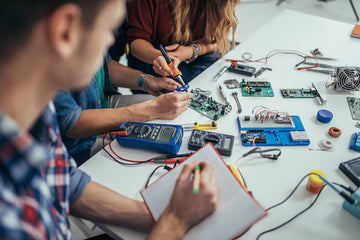
A portable generator is used to produce electricity when temporary or remote power is required. Often used on construction sites or to power facilities during power outages or disasters, portable generators are powered by internal combustion engines, and must be used with care to avoid injury and fire. The portable generator safety tips provided here help prevent such hazards.
Portable Generator Hazards
The common hazards created by portable generators include:
- shocks and electrocution
- carbon monoxide poisoning
- fire
- noise and vibrations
Generator Safety Tips for Preventing Electrical Hazards
Generator use often occurs during emergencies, when people are already under stress and likely to make mistakes. Be sure whoever operates your generator has electrical training, and remember these safety tips:
- If you plan on connecting a portable generator directly to your electrical system, generator transfer systems must be installed by a qualified electrician. Without generator transfer switches, attaching a generator to your electric system can energize wiring systems. This danger is not limited to your own system--surrounding power lines and wiring can also be energized, putting utility works and the public at risk.
- Generator transfer switches allow a generator to directly power hardwired appliances without running extension cords from the portable generator, negating extension cord hazards.
- If you need to power appliances with extension cords, only use cords recommended by the portable generator manufacturer. Undamaged, grounded three-prong cords must be used. Only use cords which are rated for your electrical equipment; underrated cords are a fire hazard.
- If the portable generator powers equipment in wet or damp locations, use GFCIs (ground fault circuit interrupters). GFCIs cut power if the electric current flows outside its normal path. Equipment used in wet or damp environments must be listed and approved for such conditions.
- Do not overload the generator. Doing so can cause it to overheat and cause fires.
- Before using any portable generator, check the manufacturer's instructions to ensure the unit is properly grounded and all grounding connections are tight.
- A portable generator needs to be kept dry. Never run a generator exposed to rain or water, and do not work with the generator’s electrical components with wet hands or while standing in water.
- Do not attempt to use a portable generator to run equipment saturated or submerged in water--such equipment must be dried completely and evaluated by a professional electrician before use.
- If equipment smokes or emits strange odors, cut power to it immediately.
Generator Safety Tips for Carbon Monoxide Protection
Approximately 66 people die every year from portable generator-related carbon monoxide (CO) poisoning. A colorless, odorless gas produced as a byproduct of internal combustion, at high levels carbon dioxide can kill in as little as five minutes. The following portable generator safety tips reduce the risk of CO poisoning.
- Never run a portable generator indoors or in an enclosed space, including basements and garages. Opening doors and windows may not be sufficient to prevent a buildup of carbon monoxide.
- For proper ventilation, a portable generator should be outside with three to four feet of clear spacer above it and on all sides.
- Position portable generators at least twenty feet from buildings, well away from doors, windows, and vents.
- Know the symptoms of carbon monoxide poisoning. If dizziness, headaches, nausea, or fatigue occur while operating a portable generator, exit the work area. Go outside to an area of fresh air and call for immediate medical personnel. Do not attempt to re enter the affected area until given the all-clear by trained personnel.
Fire Hazards and Generator Safety Tips
Generators produce heat when in operation, and can remain hot enough to ignite combustible materials for some time after they’re shut down. Keep these safety tips in mind:
- Generator fuel can ignite if spilled on the generator’s hot engine components. Before refueling shut the generator down and allow it to cool.
- Store generator fuel well away from open flames and heat sources.
- Generator fuel must be stored in approved containers designed for their contents.
- Vapors from gasoline and other fuel can travel a surprisingly long way to ignition sources. This includes vaprops from spills.
Noise and Vibrations
Portable generators cause enough noise and vibration to damage hearing and cause fatigue. Run generators as far away as possible from work areas, and wear hearing protection if this is not possible.
Proper training in emergency power and generators helps prevent injuries while providing the power your business needs to survive the next blackout or operate in remote regions. With care and foresight, portable generator hazards can be safely controlled.









Comments
Sorry, no comments found for this article